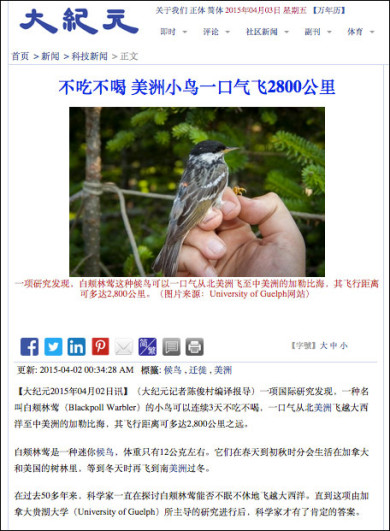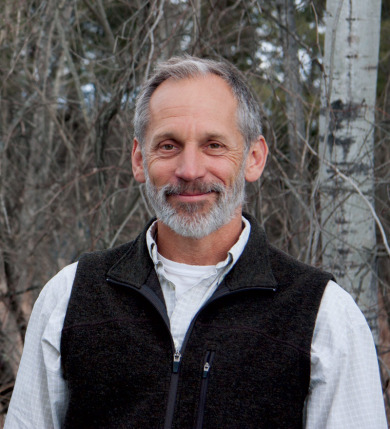 Chris Rimmer’s media moment, his more than 15 minutes of fame this week, began innocently enough with an interview broadcast on Vermont Public Radio. As news trickled out that Blackpoll Warblers flew non-stop for up to three days in migration over the Atlantic Ocean, the phones here at VCE began to ring. And ring.
Chris Rimmer’s media moment, his more than 15 minutes of fame this week, began innocently enough with an interview broadcast on Vermont Public Radio. As news trickled out that Blackpoll Warblers flew non-stop for up to three days in migration over the Atlantic Ocean, the phones here at VCE began to ring. And ring.
Reuters International wanted an interview with Chris. Vermont’s own WCAX TV would stop by. Then the Toronto Globe and Mail called. The Associated Press planned a story. So did the Washington Post. Then Newsweek was on the line. PBS’s Newshour checked in.
Our executive director, who helped describe the blackpoll migration in new research, spent the entire day Tuesday and most of Wednesday on the telephone and online. (It didn’t help that the hard drive on Chris’ laptop chose this particular media moment to crash.) The calls came from as far as Brazil’s Correio Braziliense and Britain’s Daily Mail. Articles appeared everywhere from the Japan Times to The New York Times, from the International Business Times to Science Times. Chris even connected with news outlets (at least we think they’re news outlets) called Motherboard (from Vice Magazine) and an app-based outfit going by the name of Rivet Radio. Chris’ peak moment during the frenzy came at about 6PM on Tuesday, when, in the middle of a phone interview with Newsweek, and with several messages and emails yet to return, he had to deny a couple of Skype entreaties from Chicago.
 By Thursday, Chris could get back to the work of conservation biology and running VCE.
By Thursday, Chris could get back to the work of conservation biology and running VCE.
“At last, I think I’m now officially old news,” Chris said. “But the warbler has always been the real star in this story.”
The blackpoll research spread like nothing we’ve seen here at VCE. And we’re thrilled to tell the story of this songbird. This wasn’t the first time VCE, a small group of conservation biologists, had gone global. If you know VCE, you know that although most of our research and citizen engagement happens here in Vermont and the Northeast, we also work in the field from Canada to South America – and across North America. After all, birds like Blackpoll Warblers, Bobolinks and Upland Sandpipers know no international borders. In order to conserve wildlife species close to home, we sometimes need to find and study them far away as well. That includes knowing where and how they migrate. And that’s why the Blackpoll Warbler research, besides being ground-breaking biology, is so critical to songbird conservation in general.
We’re glad the world took note.
Here’s a small sampling from this week’s Blackpoll Warbler chronicles (including a few articles for the multilinqual among us):
- The Washington Post
- PBS Newshour
- WCAX-TV
- Toronto Globe and Mail
- The Japan Times
- The Epoch Times (Korea)
- The Daily News (Thailand)

This has me captivated…the more I learn about birds the happier I am…Thanks and I so happy this has gotten the world wide attention that it deserves…
Compelling story, well told. Your excitement really comes through. Nice,
Well deserved publicity. I am proud to be associated with VCE!
Thanks to Chris and his staff…
The world now knows that VCE rocks!!!
Keep on rockin” guys and keep up the good work you all do with birds and the environment.